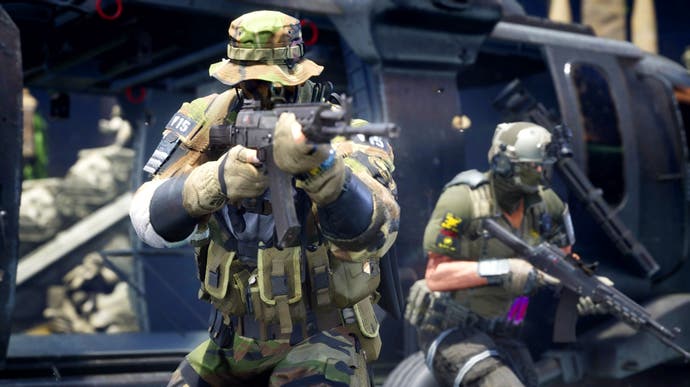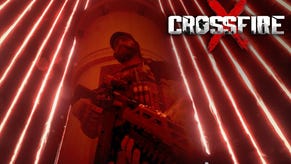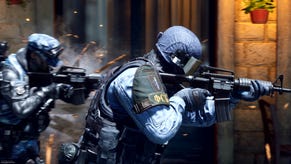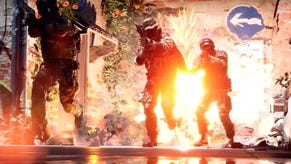Remedy on making a Call of Duty-style campaign for the biggest FPS in the world
It's bullet time.
It feels like a bizarre fit. Remedy, developer of esoteric third-person adventure games such as Control, Quantum Break and Alan Wake, is making a military first-person shooter campaign for the biggest game on earth. I mean, Remedy has never made an FPS before. So, what's going on?
CrossfireX was announced as coming to Xbox during Microsoft's E3 2019 briefing, but you'd be forgiven for missing it - or even forgetting about it. It felt like a curio then, one of those bring a massive game from Asia to the west and none of us really care sort of jobs. But the original Crossfire is probably the most popular game in the world, with over 650 million players, predominantly in South Korea and China. It's like Counter-Strike, with two factions shooting each other to infinity and beyond. And it's been going a long while: 10 years, developer SmileGate said. It's a really big deal. A massive deal, in fact.
But how did Remedy get roped in? At XO19, I had a chat with SmileGate's Jin Woo Jung, who told me he's a massive fan of Max Payne and so Remedy was his first choice when it came to working out who would make a campaign for the western version of Crossfire, and then I interviewed Remedy's Tuukka Taipalvesi and Thomas Puha to get the lowdown on how it all came to be, what's going into Remedy's take on a Call of Duty campaign, whether it'll have bullet time, and a cheeky question about whether there will be a Control 2.
I asked the SmileGate chap, why Remedy? And it turns out he's just a really big fan of Max Payne and it was just like a personal thing. He obviously didn't pay for the whole thing out of his own pocket, but I get the sense that was why he wanted Remedy to do it.
Puha: Well, it wasn't quite that simple, but that takes you a long way when people who want to work with you like what you've done.
Taipalvesi: They will actively try to seek you out and basically then get you involved and luckily, we had a mutual friend who basically was able to translate communications, and then our schedules matched and the stars aligned, and then we started to work together.
Did you guys know anything about Crossfire when contact was made? It's not a big game over here yet. But did you have to do research, find out what it was about, play the game? How did you react to that initial contact?
Taipalvesi: I've been big in esports for quite a long time so I had heard of it. I had heard there's this game being played by millions, but because its availability in Europe wasn't that high, it wasn't really on my radar. But as soon as these guys contacted us, I was like, okay, so now is the perfect time for me because I now have a reason to actually dig in and try to find out more about this game and this IP.
Crossfire has over 650 million players. You're making the campaign for the biggest game in the world.
Puha: You hit the nail on the head - not the coffin.
Not yet!
Puha: That's exactly how we also looked at it. That's an interesting place to be to get to flex our muscles and get to make a first-person shooter. A lot of us want to make an FPS. Like, what would that look like?
You're not known for FPS.
Taipalvesi: No. this is the first FPS we've done. But what we are known for is world-building, interesting characters and everything else. So it was a very, very interesting mental mind map. What do we need to know from Crossfire in order for us to be able to mentally construct the sandbox for ourselves? How do we play in this space? And then start to do the world-building as well as character-building.
My understanding is the game as it is, is one faction versus another faction, and that's pretty much it. How do you turn that into the kind of thing you're known for, which is incredibly evocative world-building, with lore in the walls and the fabric of a video game space?
Taipalvesi: If you take a super long lens look at it, yeah, it's two factions. But then again, it's two factions and a shit-tonne of shades of grey. So it's not like it's good versus evil. There are good and evil characters on both sides of the conflict. That allows us so many multiple viewpoints into the world. Even though, on a high level, it's one faction versus another, it gives us so much to play with. And that has been a key thing for us in this relationship, in that we have a large sandbox and we have a lot of creative freedom to play within it.
They built this over a decade and a lot of people don't really understand or see how much layering and world-building they have done on their own side through the multiplayer maps. And they've done that layer to layer. So we've had to do a bit of archaeology to dig through all of that, construct it into a cohesive worldview and then start to ask, what are the historical events within this timeline that we want to then extrapolate into events?
Are you going to have bullet-time?
Taipalvesi: Not going to go into gameplay details yet!
I mean, he loves Max Payne. He basically wants you to make a Max Payne FPS for his massive game.
Taipalvesi: Let's get back to that next year.
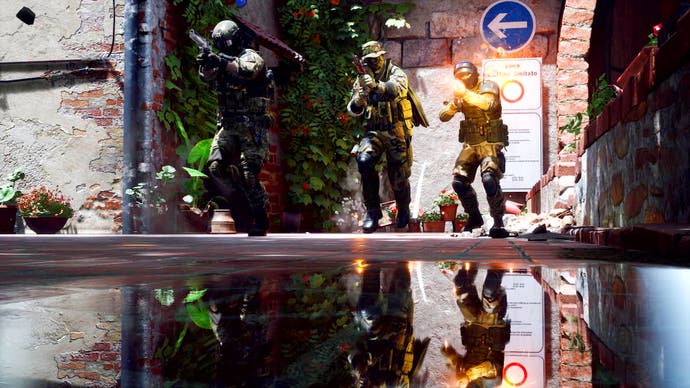
Can you give me a sense of the scope of the endeavor internally? I know you guys do a lot of different things with different teams, and you've just come off Control. What's the scope internally for this campaign?
Puha: We don't want to give exact numbers. But it's pretty easy for you to look at the size of Remedy. We're 250 people at this point.
Taipalvesi: We've grown a lot. New office space. Internal mo-cap studio. We do have the people.
Puha: Control has ramped down for a while. We're doing content on that as well, but the main game has shipped. There's Tuukka's team, which has been at this for a while. And then we have our engine team and tools team. And that's always a fluctuating thing, like, how many of them are actually in the game teams as opposed to, they're now in the engine team and so on.
Taipalvesi: It's the plusses and minuses of a multi-project organisation. You can have the muscle of everyone you need, but at the same time, you need to take care of all these specialist strands within the company as well as all the projects and products in the portfolio we have.
Puha: It's been an interesting few years.
How long have you been working on this?
Puha: Since 2016. Not to say we had tonnes of people immediately at this, but we've been at it for a while, for sure.
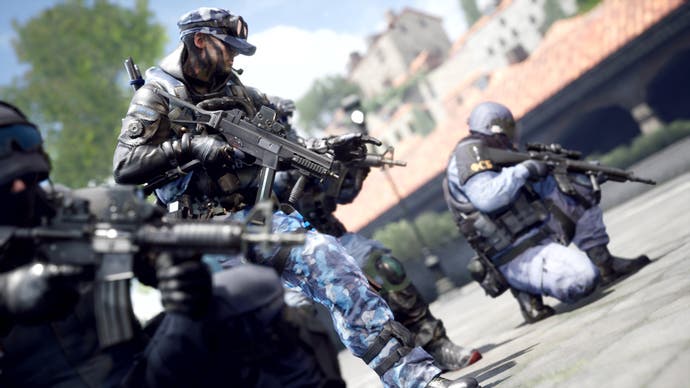
Do you envisage this being something you will stick with after release? Or - I don't want to use the term fire and forget - but you are doing work for hire. So how do you view it internally? Is it a service game you will be involved in long-term? Or are you delivering and then that's it?
Puha: First and foremost, we're just concerned about making our content as good as it can be. Without that, there's really nothing else. I'd say, SmileGate, whatever they do, they're in it for the long haul.
Taipalvesi: If you look at the original Crossfire that's been out for 10 years, they keep on adding to that, and they have a lot of lore and world-building already. So there is a wealth of information for us to dig through and construct the campaign, as well as the characters and then different kinds of ways to look at the world through these two different factions. So there's a lot we can do.
Is it like Remedy getting the chance to do a Call of Duty campaign?
Puha: Well, we don't want to compare! That's a slippery road to go down. Hopefully next year people will see the campaign. But yes, a lot of us play FPS games. We have a bunch of people who worked on Battlefield. There are a lot of people at Remedy who are really up for it. The nice thing has been to be able to focus on the universe and doing the things we are good at.
Taipalvesi: We cannot wait to give people a taste of our take on the genre.
You guys are working with Microsoft again, huh?
Taipalvesi: Yes. Yes we are. But then again, how we started this was a developer-to-developer relationship with SmileGate. That's been the strand for us for the longest time. And then SmileGate branched out and partnered with Microsoft. We're extremely happy to be working with these guys again, because there's a lot of friends that we have on this side of the table.
Puha: A lot of the same people we worked with on Quantum Break are still there.
You're back doing a Microsoft exclusive, like it's 2013.
Puha: Yeah, but for us it's like, we're working on the single-player content and the campaign. And then a lot of the other things are like, well, that's not really our concern, which is a nice place to be in.
On Control, now the dust has settled on that project, can you say anything about the future of it?
Puha: We got to create exactly what we wanted and there's definitely more to come. I mean, pretty soon actually. And then we have the expansions as well. So we're going to talk about some of that relatively soon. There's been a team working on post-launch for quite a while. A small team, but yeah, there will be some more stuff soon.
Will you do a sequel?
PR: Ah! You get the one Control question!
Ah! Control over Control! Thanks very much for your time.
